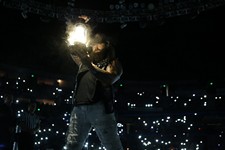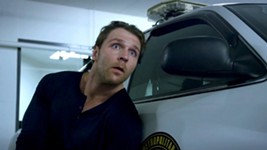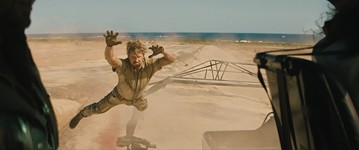Farewell to Dusty Rhodes
How the American Dream spoke to and for blue collar America
By Richard Whittaker, 12:30PM, Mon. Jun. 15, 2015
Last night, wrestling promotion the WWE began its annual Money in the Bank pay per view on a somber note. The assembled roster stood silently as the bell was rung 10 times for Dusty Rhodes: One of Austin's greatest sons, and a true professional wrestling legend, who died last week at the age of 69.

There are many in the 512 area code who probably have no idea that Rhodes – the self-described 265 pounds of blue-eyed soul – was an Austin native. Born in 1945 in East Austin, the son of a plumber, Virgil Riley Runnels Jr. had a college football career at West Texas State (now West Texas A&M), before going pro with the short-lived Continental Football League. But it was as a professional wrestler that he became a household name.
Every wrestler has a gimmick, a persona, and Rhodes was known as the American Dream. Runnels owed his to famous manager Gary Hart, who took a chance on the inexperienced athlete when he was working in Dallas. Hart gave him the name Dusty Rhodes as an homage to Larry Rhodes, Andy Griffith's character in 1957's A Face in the Crowd. In the film, Griffith plays a downhome, blue-collar drifter who charms his way to become a radio station folk hero. But Larry imploded under his own drunken arrogance. Dusty remained a folk hero.
Rhodes didn't look like the traditional professional wrestler. He was big, but he was doughy. Before his memorable match with Ric Flair at Starrcade 1985, he said, "I admit, I don’t look like the athlete of the day supposed to look. My belly’s just a lil’ big, my heiny’s a lil’ big, but brother, I am bad. And they know I’m bad." He could fight, and he could get bloody with the best of them. But what he really had was a gift for reaching through the camera and talking straight to the audience. Pro wrestling in America is, historically, a blue-collar preoccupation. Its characters were larger-than-life bruisers and Greek Adonises. The audience could admire them, but never be them. Dusty Rhodes was different: tubby, tough, a mass of scar tissue on his forehead and a criss-cross of welts on his side from too many bloody matches. He was all heart and passion, and the crowd identified with him. He spoke to them, and for them.
It was all summed up in that 1985 promo. Rhodes looked through the lens and told his fans that Flair had put "hard times" on him and his family. But that was just the start. He eloquently summed up what was happening to America's working class in Reagan's America. He said, "You don’t know what hard times are, daddy. Hard times are when the textile workers around this country are out of work, they got four or five kids and can’t pay their wages, can’t buy their food. Hard times are when the auto workers are out of work and they tell ‘em to go home. And hard times are when a man has worked at a job for 30 years, 30 years, and they give him a watch, kick him in the butt and say, 'hey, a computer took your place, daddy.' That’s hard times."
Gary Hart screwed up. He should have called him Dusty Joad, after Steinbeck's hero (although perennially proud Texan Rhodes, who regularly turned up to booking meetings in a Longhorns cap, might have had some issues being compared to an Okie.)
But it was that understanding of what it meant to scrimp by that made Rhodes a star. When he talked about driving hundreds of miles to get beaten bloody and raw for a $25 paycheck, people knew what he meant. And when he borrowed the cadences and emphases of the East Austin black baptist churches he attended as a boy, he crossed the racial divide. That's why crowds cheered him when he took on the self-proclaimed stylin', profilin', limousine riding, jet flying, kiss-stealing, wheelin'n'dealin' son of a gun Flair. That's why they roared when he took the National Wrestling Alliance world heavyweight championship, and dozens of titles across the old territories. That's why they followed him from the NWA to WCW and the WWE. No matter how big a celebrity he was, they felt they still knew him.
Rhodes retired from full-time performing more than two decades ago, instead making the odd appearance, and handling booking and creative duties for a variety of promotions. His real passion in his later years was working with young talent. That's something he knew about, since his two sons – Dustin and Cody – have both become internationally renowned wrestlers in their own rights (Dustin as the bizarre Goldust, Cody as Cody Rhodes, now Stardust). In recent years, he had returned to the WWE in a creative role, as head writer for its NXT brand, where the next generation of wrestlers is trained to become superstars.
In wrestling, his legacy will be incalculable. It's in the redneck swagger of a legend like Stone Cold Steve Austin, and the way that the industry's fastest rising star, NXT champ Kevin Owens, talks about wrestling to feed his kids.
But it's the crowds they please that matter the most. Rhodes understood that, even if pro wrestling may be beneath contempt for some, it means everything to the fans that paid his salary and kept his kids fed and in school. During his 2007 WWE Hall of Fame induction speech, he reached back to that famous Hard Times promo. "You go home and you see people just dying out there on the streets and crying about their children being in Iraq, that's hard times. Being kicked off the assembly line here in Detroit after 40 years, they give you a watch, that's hard times. It's our duty to make it good times for the fans who pay the money to watch us perform, each and every night."
A note to readers: Bold and uncensored, The Austin Chronicle has been Austin’s independent news source for over 40 years, expressing the community’s political and environmental concerns and supporting its active cultural scene. Now more than ever, we need your support to continue supplying Austin with independent, free press. If real news is important to you, please consider making a donation of $5, $10 or whatever you can afford, to help keep our journalism on stands.
Richard Whittaker, June 23, 2017
Richard Whittaker, Aug. 15, 2016
Richard Whittaker, Dec. 30, 2015
May 9, 2024
May 10, 2024
Pro-wrestling, WWE, obituary, Dusty Rhodes, Goldust, Cody Rhodes












